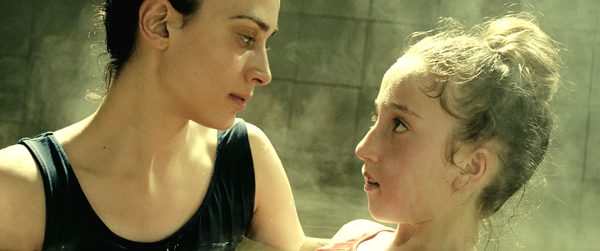Some people never quite got over communism. The hectoring spirit of Marxism-Leninism, and then its deafening absence, echoes through Bulgarian auteur Maya Vitkova’s Viktoria, a near-epic unspooling of grandiose allegory, deadpan satire, absurd magic realism, and depressive family drama, all co-existing in one movie. High-style cinematography and compelling visuals will keep some enthralled, while others may be frustrated with the all-over-the-place narrative. There’s no question Vitkova is ambitious; to what end is not always as clear.
Although many, many themes cross-pollinate throughout, Viktoria divides broadly into thirds. In the first, Boryana (dark, feral, and beautiful Irmena Chichikova) pores over fashion glossies, yearning for the West. She’s trapped in a miserable flat, stifled in a loveless marriage, and fed up to the back teeth with her life’s commie shade of drab, so Boryana’s pregnancy does not come as welcome news. Attempts to rid herself of the baby are not only painful but don’t work. Neither do attempts to escape to the yearned for city of Venice. Unwanted by her mother, baby Viktoria arrives without a navel—the lack of which makes her an unlikely symbol of progress for the regime (“We no longer need umbilical cords!”) and a fetishized child star, photographed and feted in cheesy ceremonies.
Celebrity takes center stage in part two, with Viktoria (at this age played by the director’s niece Kalina Vitkova and earlier played by another niece, Daria Vitkova) growing up into a nasty tween brat pampered by the state. The director devotes considerable talent and brio mocking communism in this section. Sweeping deep-perspective set pieces of giant monuments, flags waving to blaring music, and mobs of applauding toadies reveal how communism made small countries like Bulgaria feel big. Egos blow up, too, with mother rolling her eyes in scorn at the regime’s blandishments and Viktoria extorting cheers from fellow Young Pioneers as she regales them with tuneless, inept pounding at the piano. The arrogant child is now a special protégée of folksy Bulgarian dictator Todor Zhivkov, with chauffeur service and a red telephone to the center of power.
Then communism suddenly collapses, and in a cutesy contrivance, the filmmaker has a giant finger descend from the sky to knock Viktoria over. The regime’s demise leaves the household with the wind leached out of its sails, and the morose last arc of Viktoria is devoted to family healing and a search for reconciliation that never comes—Boryana is still as cold and bloody-minded as ever. An escape takes place at the end, but it’s unclear whether it provides the catharsis that everyone needs.
Vitkova has approached her hydra-headed project with a freewheeling gusto that can feel adventurous one minute and borderline bughouse the next. Newsreels of Mao, Zhivkov, Thatcher, the Berlin Wall and a cornered Nicolae Ceausescu set the time line. Dripping milk, blood, and water serve as heavy symbols. Kitchen-sink neorealism (nursing issues, marital dysfunction, visits to the gynecologist) meets the fanciful mass adulation for Viktoria’s belly-buttonless tummy. As a result, the nonstop virtuoso shots rocket the production to a visual stratosphere, so much so you beg for a breath of plain old fresh air.
But for all the overkill, the filmmaker imposes some clear-eyed control over selected aspects of her story. There is no mistaking her point that women’s bodies exist as the property of men or of the state. Scenes make the connection clear between one kind of groupthink (communism) to another (nationalism). On a more granular level, the perfect production design recaptures the musty fag end of communism behind the cast-of-thousands pep rallies, the plants that need repotting, the chilly bathrooms, and the battered factories churning out goods that nobody wants.
What happens when an ideology dies? We’re left with no loves, no hates, and no parades, just our own business to attend to. Whether we live under capitalism or a dictatorship of the proletariat, we’re always a little uncertain about where we are, hoping for a better life out there somewhere. Under the manic, action-packed surface of Viktoria, these sober facts may be the ultimate message—maybe.







Leave A Comment